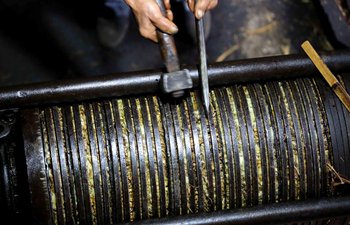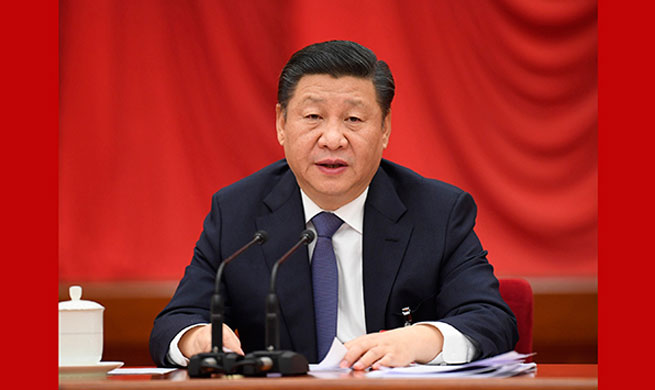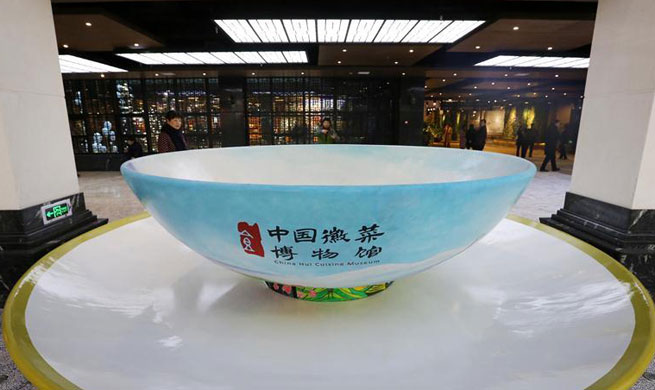by Liu Xin, Cao Pengyuan
BEIJING, Jan. 19 (Xinhua) -- Every now and then, Li Shuang stands by the window of her office and looks out over the incessant stream of traffic on the Third Ring Road of Beijing.
The 36-year-old still remembers when cars were rare in the country.
"When I was a child, if someone drove a vehicle, he would receive the admiration of others," said Li, the CEO of a cultural and creative company.
In 40 years of reform and opening-up, China has transformed itself from a land of bicycles to a global automobile market, where a wide range of car brands and models can be seen on the road.
It has become more and more common for Chinese families to purchase a second or a third car. Automobiles have greatly extended the sphere of Chinese people's lives. But more than that, they have become a symbol of individuality.
Driving her imported SUV Volkswagen Touareg, which cost 800,000 yuan (more than 120,000 U.S. dollars), Li Shuang has made long road trips from Beijing to southwest China's Tibet Autonomous Region four times since 2014.
One night in 2015, Li encountered a huge storm on her way from Golmud to Lhasa, the regional capital of Tibet.
"Without street lights, I was not sure whether my car had deviated from the planned route or not," Li recalled. "Then the car was stuck in the heavy snow, which left me desperate."
Fortunately for Li, with the aid of People's Liberation Army soldiers nearby, she and her car were dragged out of the snow. From that point on, her car was more than a vehicle for her -- it was a friend that accompanied her through thick and thin.
Li's story is linked with the national story of China. In 1978, China started its reform and opening up, which has enabled hundreds of millions of Chinese people to own private cars. By the end of 2016, the number of private cars in China had reached 165.59 million.
According to newly released data from China Association of Automobile Manufacturers (CAAM), China produced some 29 million automobiles last year and sold 28.9 million, ranking the first in the world for nine years in a row.
"When the country has such a big amount of both auto production and consumption, it's time now to discuss the culture behind the booming industry," Li Shuang said.
According to Beijing Auto Museum, automobile culture encompasses both the material and symbolic aspects of cars. Auto culture exists when cars go beyond transportation and influence people's lives and social development.
AUTOMOBILE CULTURE ON THE ROAD
In 1994, China released its first automotive industry policy, encouraging private car purchases while forbidding local government sectors from intervening in people's legitimate car purchases or use through administrative or economic means.
Since then, more Chinese families have been buying their first cars. Wang Chao, president of Kaiyun Motors, acknowledged that it was still too early for China to have its own car culture.
"Customers care more about the dynamic performance, appearance, and cost performance of cars," Wang said.
In China, there are vintage car collections that serve as a record of auto history and culture. "But they are a minority interest," said Wang.
China's top auto website Yiche.com received 151 million daily page views in the third quarter of 2017.
Websites and smart phone apps provide information on new car releases, price comparisons, and performance evaluation, while it's hard to find channels for automobile history and culture.
Hongqi, which literally means red flag, is one of the best known Chinese automobile brands. Jia Yanliang designed the shape and interior of its classic CA770 model in 1964.
The 78-year-old senior said automobile culture has passed from generation to generation, just like automobile powers such as the United States.
"China is seeing a lot of vehicle consumption," Jia said. "We can see traffic jams in remote county towns."
"The knowledge of brands' culture and background are still necessary for drivers if they really hope to know their cars," Jia said.
GLORIOUS HISTORY
In 1958, China assigned the task of manufacturing a high-end domestic sedan to the First Automobile Works (FAW), naming it "Hongqi" to celebrate China's 10th National Day in 1959.
The sedan's logo featured Chairman Mao Zedong's calligraphy and a red flag. The CA77X range has been used as the National Day parade sedan and the vehicle for state guests ever since.
While designing the sedan, Jia referenced the lines and edges of Ming Dynasty (1368-1644) furniture. "Chinese traditional culture provides rich inspiration for domestic auto designers," Jia said.
"Meanwhile, we designers should know the trends of the global automotive industry and understand the products' target consumer," Jia said.
Wang Chao said that a country's automobile culture is correlated with its productivity.
"When we have more classic and outstanding models, the sense of branding and belonging will improve among consumers," said Wang.
FAW Group will introduce 17 car models, mostly electric, by 2025.
FAW, established in 1953 and based in Changchun, northeast China's Jilin Province, has other brands, including Jiefang and Besturn. It also has joint ventures with major foreign car-makers such as Volkswagen and Toyota.
In Beijing, BAIC Group began cooperating with Chrysler LLC of the U.S. and established China's first automobile joint venture, Beijing Jeep Co., Ltd. in 1984.
NEW ENERGY, NEW WAVE
Li Shuang left her SUV in Tibet after her last long journey there. In 2016, she bought a new car -- the famed Model S electric sedan produced by Tesla.
"New energy vehicles go beyond categorization as just another 'emerging industry.' Rather they herald the emerging phenomenon of car culture in China," Li said.
According to statistics released by CAAM, in 2017 there were 794,000 new energy vehicles produced and 777,000 sold in China, with year-on-year growth rates hitting 53.8 percent and 53.3 percent, separately. So far, 107 Chinese cities have set about issuing license plates exclusively for new energy vehicles, including Beijing.
Company founder and CEO of NIO (also known as "NextEV") Li Bin predicted that in the next decade, smart electric vehicles would go mainstream, and their impact would resemble that of the smart phone in changing how people communicate and live.
Li Bin said that although in the age of the internal combustion engine, the Chinese automobile industry lagged far behind its Western rivals, Chinese companies have already pioneered the new field of smart electric vehicles.
Over the past five years, the overall quantity of new energy vehicles nationwide has reached around 1 million, the highest in the world.
Li Bin also said that progress in auto-pilot, artificial intelligence (AI) and cloud service technology would redefine future cars not just as means of transportation, but as human-centered living spaces.
"Smart electric vehicles are a precious opportunity for the Chinese automobile industry," Li Bin said.

















